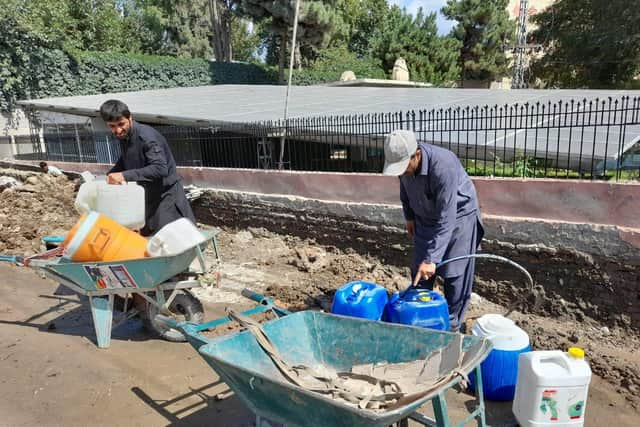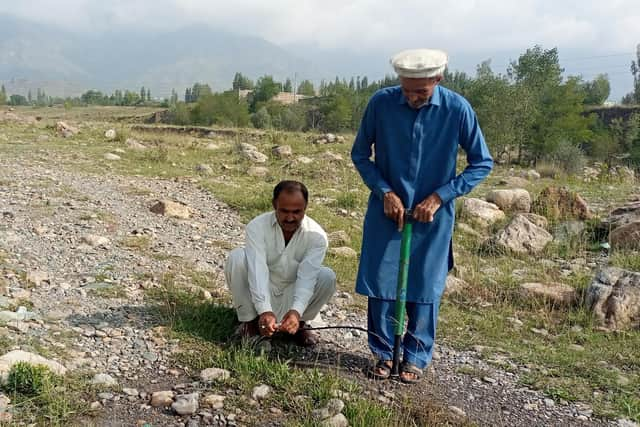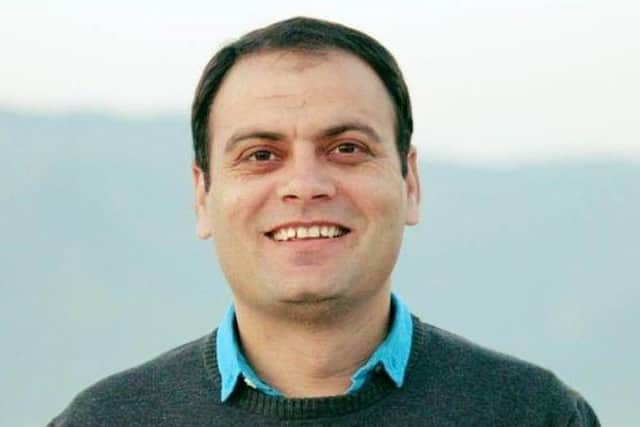COP26: The valley that provides water for local Pakistan towns is drying up
The town is situated on a neck of Pakistani territory. The total population of Kurram is 615,372. However, the upper Kurram Tehsil, Parachinar, consists of 252,436 inhabitants.
Through the small town of Parachinar runs a valley that many of the locals rely on for water. There are a few ways to source water from the Valley without using electricity. The most efficient way to source water from the Valley is through pedal powdered water pumps.
Advertisement
Hide AdAdvertisement
Hide AdHowever, the local people don't use bicycles; they just use cycle pumps. These pumps are putting air pressure in the water pipeline. When air accumulates in the pipeline, it disturbs the water flow – as a result, the water starts flowing.


Anwar Ali, 42, helps his elder brother in pumping air through one of these old-fashioned bicycle pumps. After pumping more air pressure into the pipeline, finally, he receives water and starts filling his plastic hand-carry water container.
Ali and his family are not alone. From the past ten years, the entire Parachinar city and dozens of surrounding villages have been facing severe water shortages due to streams drying up.
"In the winter, we didn't receive snow as expected,” says Syed Hussain, a 65-year-old resident of Parachinar city.


"Snow on mountains and in the city is a sign of plenty of water in summer. The last winter was sporadic. Now the residents are paying the price [with] a shortage of water."
Hussain has been surprised with the record lowest snowfall in winter. He said in the past 60 years, Parachinar had received the least snow in a season.
"We haven't seen such scorching summer in Parachinar for ages,” he says.
"Normally we don't switch on ceiling fans in summer, but it was unbearable for us this time. We don't know the reason, but nature is very unkind to us.”


Advertisement
Hide AdAdvertisement
Hide AdAs a result, locals are spending hours in the queue waiting for their turn near a government tube well to fill the hand-carry water containers.
Global warming has raised the temperature, caused climate change and transformed weather patterns in the valley.
Dr Asif Khan, from the University of Cambridge, says due to rapid industrialisation, "global warming" is the biggest challenge for the modern world.
"Global warming is the cause of the decrease in snowfall,” he says. “Limited rains and snow have affected our water cycle. It is the main reason for climate change and it is affecting our area."
Dr Khan’s latest research shows the temperature has risen sharply in northern areas of Pakistan, including Parachinar and "Speen Ghar" – a mountain range situated south of The Hindu Kush.
"The 2C rise of temperature has affected our weather system,” he says.
"We're facing intense rainfall, which leads to flash floods. The intense rains can't recharge our groundwater.”
Last month, the Pakistan Federal Ministry of Water Resources submitted a report that says in the previous ten years, the underground water table in five districts of Khyber Pakhtunkhwa, including Kurram, has dropped to 75ft.
Advertisement
Hide AdAdvertisement
Hide AdDr Khan concludes: "If the government wants to overcome, they must reduce emissions, plans renewable energy resources and construct a water reservoir."
- Muhammad Daud Khan is a producer based in Pakistan who works for Pakhtunkha Radio Kurram.
As part of his role, he reports from Parachinar, the north-west frontier of Pakistan. Muhammad is a fellow with the Climate Change Media Partnership and has been attending COP26. This article is part of The Scotsman and Earth Journalism Network partnership – set up by global non-profit organisation Internews.
Comments
Want to join the conversation? Please or to comment on this article.
